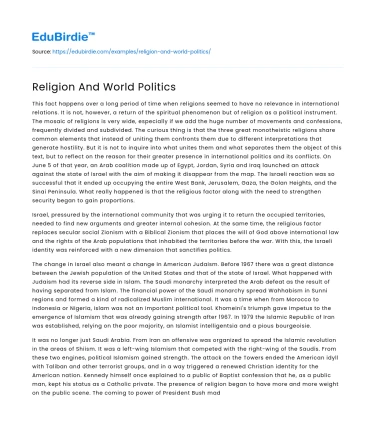This fact happens over a long period of time when religions seemed to have no relevance in international relations. It is not, however, a return of the spiritual phenomenon but of religion as a political instrument. The mosaic of religions is very wide, especially if we add the huge number of movements and confessions, frequently divided and subdivided. The curious thing is that the three great monotheistic religions share common elements that instead of uniting them confronts them due to different interpretations that generate hostility. But it is not to inquire into what unites them and what separates them the object of this text, but to reflect on the reason for their greater presence in international politics and its conflicts. On June 5 of that year, an Arab coalition made up of Egypt, Jordan, Syria and Iraq launched an attack against the state of Israel with the aim of making it disappear from the map. The Israeli reaction was so successful that it ended up occupying the entire West Bank, Jerusalem, Gaza, the Golan Heights, and the Sinai Peninsula. What really happened is that the religious factor along with the need to strengthen security began to gain proportions.
Israel, pressured by the international community that was urging it to return the occupied territories, needed to find new arguments and greater internal cohesion. At the same time, the religious factor replaces secular social Zionism with a Biblical Zionism that places the will of God above international law and the rights of the Arab populations that inhabited the territories before the war. With this, the Israeli identity was reinforced with a new dimension that sanctifies politics.
Save your time!
We can take care of your essay
- Proper editing and formatting
- Free revision, title page, and bibliography
- Flexible prices and money-back guarantee
The change in Israel also meant a change in American Judaism. Before 1967 there was a great distance between the Jewish population of the United States and that of the state of Israel. What happened with Judaism had its reverse side in Islam. The Saudi monarchy interpreted the Arab defeat as the result of having separated from Islam. The financial power of the Saudi monarchy spread Wahhabism in Sunni regions and formed a kind of radicalized Muslim international. It was a time when from Morocco to Indonesia or Nigeria, Islam was not an important political tool. Khomeini's triumph gave impetus to the emergence of Islamism that was already gaining strength after 1967. In 1979 the Islamic Republic of Iran was established, relying on the poor majority, an Islamist intelligentsia and a pious bourgeoisie.
It was no longer just Saudi Arabia. From Iran an offensive was organized to spread the Islamic revolution in the areas of Shiism. It was a left-wing Islamism that competed with the right-wing of the Saudis. From these two engines, political Islamism gained strength. The attack on the Towers ended the American idyll with Taliban and other terrorist groups, and in a way triggered a renewed Christian identity for the American nation. Kennedy himself once explained to a public of Baptist confession that he, as a public man, kept his status as a Catholic private. The presence of religion began to have more and more weight on the public scene. The coming to power of President Bush made the White House the most religious in history. The Christian right emphasized its coincidence with the Orthodox Jews.
Coincidence not only in religious aspects but also in that the occupied territories must be preserved for Israel and continue colonizing until completing the work of Greater Israel. In this context, religion in modern European politics has a limited presence. Another thing is that more than forty religious offices lobby in Brussels and in their own way try to influence European policies. Yes, the voices that, predicting a majority of the Muslim population within a few decades, proclaim the need to define the EU as a Christian confession as a vaccine are worrying.
At the moment the idea that religious beliefs must develop in the private sphere prevails. What I do believe is that the secular space that Europe occupies should facilitate the taking of initiatives to implement ecumenism and initiatives for inter-religious dialogue. Movement that in any case must seek the leaders of the three great monotheistic religions. From the dialogue that the irruption of religions must include in international politics, a new scenario of separation of both elements should emerge.
Religion must be separated from politics and a reconciliation between religions must be built. The permanent dialogue between religious leaders, I believe, is what is expected by the vast majority of believers who neither support nor approve of the political instrumentalization of religions.






 Stuck on your essay?
Stuck on your essay?

